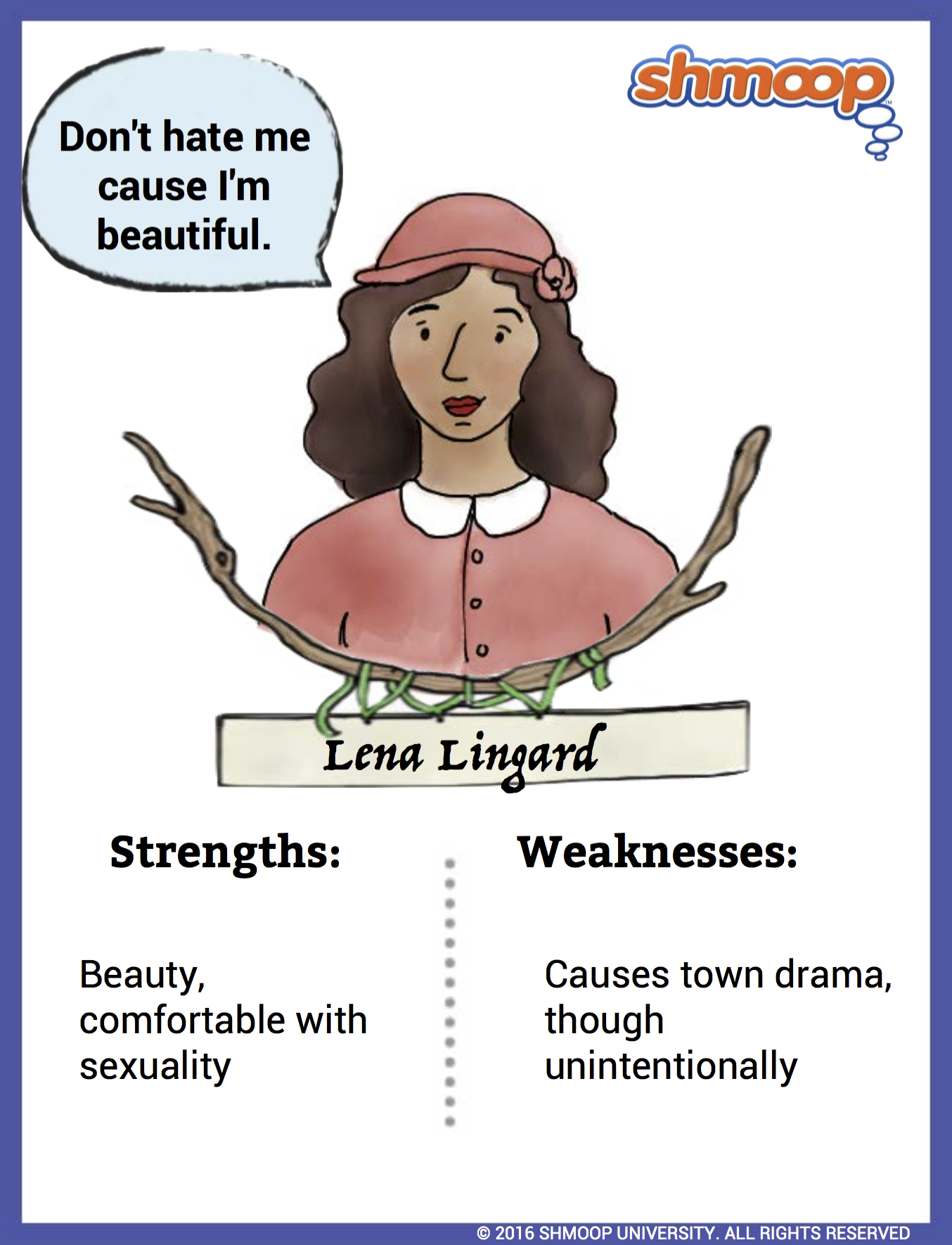Character Analysis

(Click the character infographic to download.)
(Note: according to the Oxford World Classics edition of My Ántonia, this character has no historical basis.)
Like Ántonia, Lena, too, is one of the immigrant "hired girls" who comes to town to work. Cather spends a fair amount of time describing the physicality – in particular the physical sexuality – of these immigrant girls:
[W]hen one danced with them, their bodies never moved inside their clothes; their muscles seemed to ask but one thing – not to be disturbed. I remember those girls merely as faces in the schoolroom, gay and rosy, or listless and dull, cut off below the shoulders, like cherubs, by the ink-smeared tops of the high desks that were surely put there to make us round-shouldered and hollow-chested. (2.9.4).
Lena is the embodiment of this sexuality within the group of "hired girls." Did you notice the physical detail of her "deep violet" eyes (2.4.39)? This lends a touch of exotic beauty to her character. And of course, the first we hear of Lena is a story about how she tempted Ole – however unintentionally – away from his wife Mary. What's most interesting about this story isn't Ole. It isn't even the fact that his wife, Crazy Mary, ran after Lena with a knife. It's Lena's reaction to the whole incident: "Lena only smiled her sleepy smile. 'I never made anything to him with my eyes. I can't help it if he hangs around, and I can't order him off. It ain`t my prairie'" (2.4.48).
Lena treats her sexuality with a sort of indifference. She's not ashamed of it, she doesn't try to hide it, but she also doesn't use it to manipulate men. Later in the novel, we see that Jim, her neighbor, and her landlord are all in love with her at the same time. This doesn't bother Lena, but it's not as though she wanted it this way either. She's simply indifferent. Men have always been attracted to her, and she's accepted it as part of life.
So Lena is not your typical turn-of-the-century woman. She doesn't even want to get married:"Men are all right for friends, but as soon as you marry them they turn into cranky old fathers, even the wild ones. They begin to tell you what's sensible and what's foolish, and want you to stick at home all the time. I prefer to be foolish when I feel like it, and be accountable to nobody." (3.4.50)
What's interesting is that Lena is rewarded for this attitude; she ends up a successful dressmaker in San Francisco. We see that Cather condones this attitude, even if it subversive for the time, because she rewards Lena on account of it.
While Lena is important to the novel thematically, she is also of particular importance to Jim's character. While his feelings for Ántonia are of the chaste variety, his feelings for Lena are decidedly sexual. His teenage fantasies are always centered around her:
One dream I dreamed a great many times, and it was always the same. I was in a harvest-field full of shocks, and I was lying against one of them. Lena Lingard came across the stubble barefoot, in a short skirt, with a curved reaping-hook in her hand, and she was flushed like the dawn, with a kind of luminous rosiness all about her. She sat down beside me, turned to me with a soft sigh and said, "Now they are all gone, and I can kiss you as much as I like." (2.12.25)
And of course, Lena is the only girl Jim dates throughout the entire novel. He even devotes an entire book of his memoir – "Lena Lingard" – to talk about it. It's unclear what the sexual component of their relationship is, because most of the sex in My Ántonia is subtextual or implicit. So we can't say one way or the other what happens between these two.